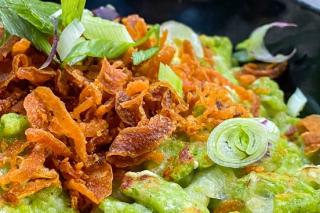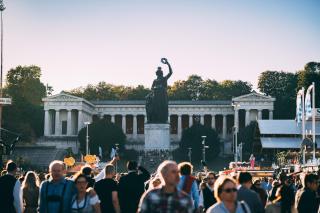Oktoberfest ecological
A lot has happened since 1991, when regulations on waste reduction were included in the Oktoberfest's operating regulations for the first time. In cooperation with other municipal departments, strategies have been developed to organise the world's largest folk festival in the most environmentally friendly way possible.
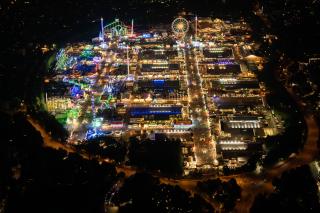
Eco-points at the Oktoberfest
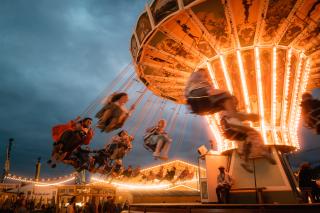
Since 1995, applicants for a place at the Wiesn have been able to score points for "ecological compatibility" during the authorisation process. Among other things, the use of biodegradable hydraulic oil, the sale of products from regional and organic cultivation or energy-saving measures, for example the installation of a solar system, the use of electric vehicles and certification as a CO2-neutral operation overall or - in the case of the rides - CO2-neutral transport are taken into account in the assessment.
ÖKOPROFIT München
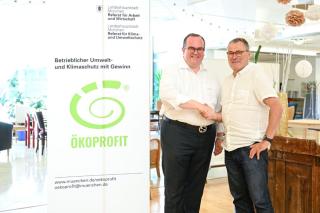
43 Oktoberfest businesses took part in the environmental consulting and climate protection programme ÖKOPROFIT Munich in 2021. In 2022, seven more businesses completed the programme. In 2023, 21 businesses will again take part in the ECOPROFIT round. Together with the participants, ÖKOPROFIT Munich defines technical and organisational measures through professional environmental consulting in order to save raw materials, water and energy, avoid waste and reduce emissions. At the same time, the workforce of the participating company is sensitised to environmental issues and integrated into the company's environmental management. Measures include offsetting site-related CO2 emissions, saving water, for example through waterless urinals, the use of electric vehicles, but also the composting of fruit waste or the avoidance of paper towels in toilets or aluminium bags in street vending. ÖKOPROFIT Munich is a cooperation between Munich companies, the Department of Labour and Economic Affairs, the Department of Climate and Environmental Protection, the Munich Waste Management Company, the Chamber of Industry and Commerce for Munich and Upper Bavaria, Stadtwerke München and Munich University of Applied Sciences.
Climate-neutral Oktoberfest businesses
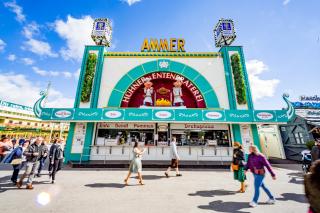
Since 2016, the Ammer Hühner- und Entenbraterei has been the firstclimate-neutral marquee at the Wiesn. Here, unavoidableunavoidable CO2 emissions through projects in Nigeria (efficient cooking cooking systems for families), India (electricity generation from mustard residues) and Kenya (construction of biogas plants). This was followed in 2018 by the chicken roastery ‘Zum Stiftl’ followed. Their CO2 emissions are offset by a offset by a mountain forest project in Oberallgäu and a forest conservation project in Papua New Guinea.
In 2019, Kuffler's wine tent was also certified as a ‘climate-neutral marquee operation’ has been certified. All CO2 emissions are offset via climate protection projects: a reforestation project in the Oberallgäu, a forest conservation project in Papua New Guinea and the ‘Clean Cooking Stoves Cooking Stoves Project’ in Peru. In addition, the Oktoberfest beer from Hofbräu Munich is climate-neutral, as is its transport to the Oktoberfest and all Hofbräu beer serving tents and festival establishments. This is achieved by the renaturalisation of a moorland area in Chiemgau and a concept for of climate gases from the air into humus, implemented in Thann near Zolling.
Zolling. In addition, the Marstall Festzelt, the Café Kaiserschmarrn, the Käfer Wiesn-Schänke and the Münchner Stubn are now also
climate-neutral. Just like the Poschner chicken roastery, which supports supports forest conservation in Brazil. The other large festival tents want to follow suit soon and intend to become climate neutral within the next few years. to become climate neutral within the next few years.
Electricity supply
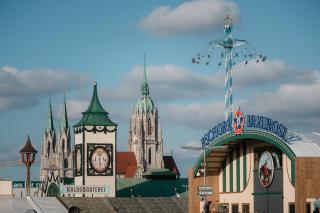
For 24 years, all public areas and facilities have been supplied with SWM green electricity for 24 years, and since 2012 also for all feeder companies.Two of them also make their contribution to the further expansion of to the further expansion of renewable electricity generation. In plants that renewable energy sources such as hydropower, the amount of electricity corresponding to customer consumption is generated and fed into the European electricity grid. SWM proves this through guarantees of origin in accordance with Directive 2009/28/EC of the European Parliament. The use of M-Ökostrom thus reduces CO2 emissions. The guarantees of origin can be precisely assigned to the respective electricity supply and and taken into account in the electricity labelling in accordance with § 42 EnWG can be taken into account.
Supply of natural gas

In addition to M-Ökostrom, all catering establishments also receive M-Ökogas. The Theresienwiese has its own pipeline network of around five kilometres to supply the festival tents and businesses with environmentally friendly natural gas.
M-Ökogas offsets the resulting CO2 emissions with reduction certificates. The certificates are used to support climate protection projects, usually with additional social aspects. Without the funds from the certificates, these projects would not exist. With M-Ökostrom and M-Ökogas for all, SWM is helping to ensure that the Wiesn is a climate-friendly event.
Waste reduction
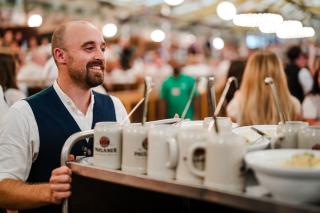
The two pillars of the waste prevention concept are the ban on disposable crockery and the strict separation of waste. Only reusable crockery and cutlery have been permitted at the Oktoberfest since 1991. Soft drinks are only sold in returnable bottles for a minimum deposit of one euro. The sale of drinks in cans is prohibited. Reusable transport containers are used for the delivery of food and beer mugs. All waste is sorted and recyclable materials are placed in the designated collection containers. Large catering establishments dispose of used glass in their own containers. Kitchen and food waste is collected separately and recycled separately. The municipal street cleaning service, which removes rubbish and waste deposits on a daily basis using electric vehicles and a small sweeper, reported a reduction in cleaning and disposal costs from 247 tonnes (2008) to around 88 tonnes (2022).
Water recycling
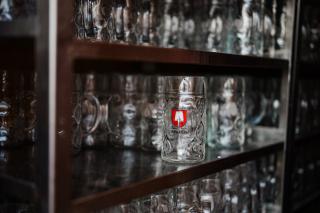
Since 1998, water has been saved at the Wiesn with the help of a recycling project.in some of the festival halls (e.g. Hacker Festzelt, Hofbräu, Löwenbräu and Paulaner Festzelt) and in the chicken restaurants, such as ‘Zum Stiftl’, resource-saving grey waterresource-saving grey water utilisation systems are in use Thanks to cascade utilisation, the rinse water from the beer mug washers is not channelled into the sewer but used for the tent toilets.
Fresh drinking water

This also avoids plastic waste: since last year, Munich's fresh drinking water has been available free of charge. After last year's great success, SWM is increasing the number to nine this year. They are installed on the outside walls of the WC facilities in the centre delivery street (behind the beer tents), at the entrance to the Familienplatzl, at the Wiesn entrance on Esperantoplatz and at the Oide Wiesn event.
Organic delicacies
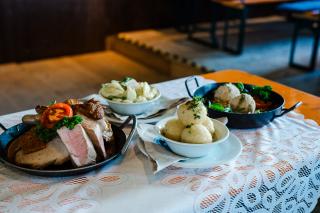
For the Oktoberfest, numerous businesses are certified in accordance with EU Organic Regulation No. 834/2007 and offer a wide range of folk festival specialities in organic quality: from classic Wiesn-Hendl to roasted almonds, from bratwurst to steak rolls, from chocolate bananas to waffles.In the Paulaner Festzelt, the Volkssängerzelt Schützenliesl, the Fischer Vroni and in the Hühner- und Entenbraterei AMMER for example only organic chicken will be sold this year. Many products carry the label "Geprüfte Qualität Bayern" or the "Bayerische Bio-Siegel". The sale of CO2-neutral products, such as gingerbread hearts from the company "Zuckersucht", is also rated positively. There is also a wide range of vegan products on offer at the Wiesn this year.
